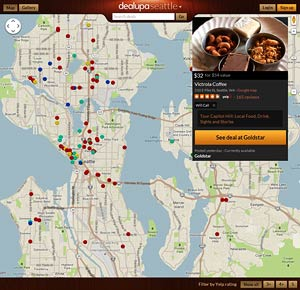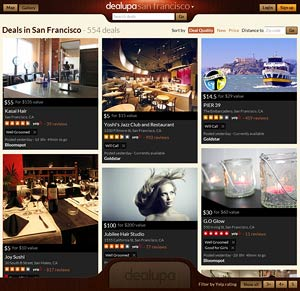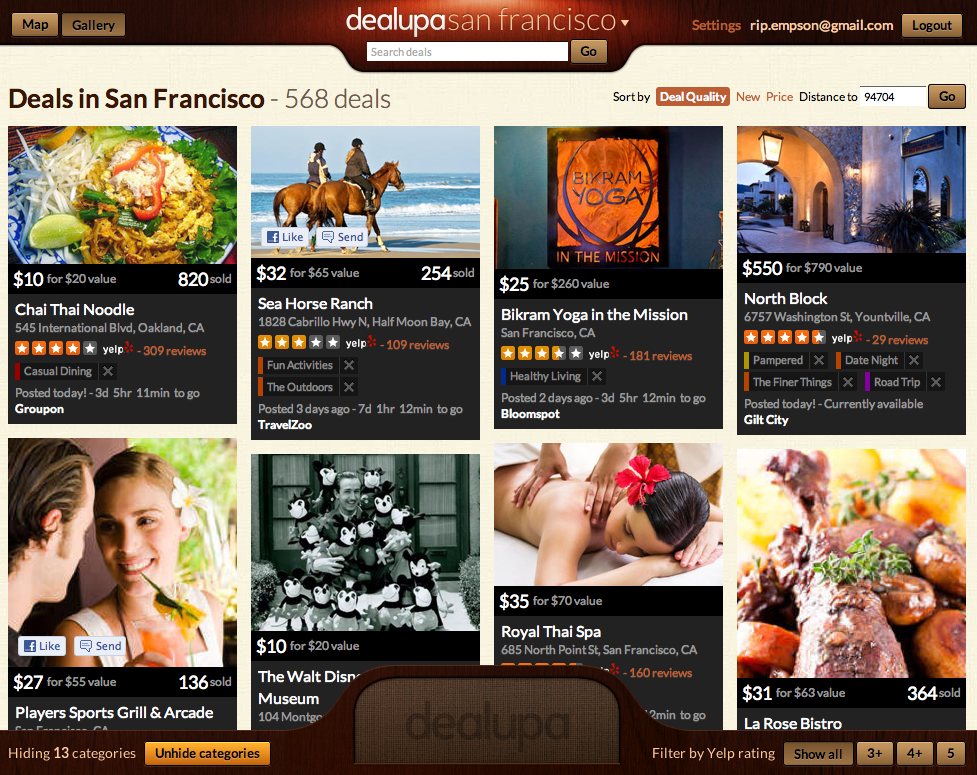If you were to stop for a moment and consider what your perfect deals site would be, chances are it doesn’t look a whole lot like any of the big names currently operating in the space. When it comes down to it, we all have our own individual preferences when it comes to products, activities, and experiences. So, the lowest common denominator would be a platform that routinely serves us great deals on the things we actually enjoy. As simple as that may sound, there are few deals players that do it well. Dealupa, a startup that’s part of Y Combinator’s current winter batch, is launching today with what it hopes is a solution to deal disappointment, aka deal fatigue.
Considering the slew of daily deals sites that have emerged, it’s no surprise then that, in an effort to serve people with deals they actually want, a number of deal aggregators have popped up to wrangle all those discounts and offers into one place. The problem is that instead of giving users better choices, these aggregators often just give us more noise. With more deals comes the need for better filtering — for better recommendation engines.
This is where Dealupa comes in. Founded by two former Google engineers, the deal aggregator is taking a page out of their former employer’s book, having created its own “Dealrank” technology (patent pending) that is designed not just to serve more relevant results to each user, but to serve deals that are of a higher quality. The algorithm is, of course, Google’s PageRank applied to deals. For those unfamiliar, PageRank is the ranking and sorting algorithm behind Google search results; by way of link analysis, the technology aims to surface pages (or content) that is most relevant to your keyword search.
Just as the success of the content aggregation/search engine depended on a smart technology (presumably designed by objective parties/technologies) that could identify both popularity and relevance to serve better results, Dealrank’s algorithm, too, is trying to boost the quality of deal aggregation by measuring popularity and relevance. Dealrank works to identify the quality of deals by combining various signals into its ranking function, which then serves the closest matches at the top of its homepage — er, your homepage.
The Dealrank algorithm considers, among other factors, how many people are sharing and liking a deal — not just in your social graph — but on Twitter and Facebook as a whole, how many people are buying the deal (and is that deal accelerating or stagnating), as well as the Yelp rating of the merchant offering the deal.
The algorithm combines these qualifiers and other intrinsic signals of a deal’s quality with users’ personal preferences and attributes, like what type of deals they like and where they’re located, to create an internal ranking. (Just to clarify, Dealupa doesn’t actually have a numerical ranking on each deal, it’s inherent to the algorithm.) But one of my favorite features of Delupa is that, when you sign on, you can browse through all the different categories of deals, and reject those you don’t want. Tired of being sent deals for spas or half off at those all-you-can eat local hamburger joints? Cross them off the list.
After that, with Dealrank plugging away behind the scene, the deals at the top of the page are supposed to be of a higher quality — and more relevant — than ranking systems that are simply social, or location-based, or just arbitrary. Dealupa is using collaborative filtering, and interestingly, Dealupa Co-founder Sanjay Mavinkurve tells us that they aren’t interested in your personal social graph.
 While Dealupa pulls in deal data on what deals are getting the most “likes” and so on from Facebook’s API, they’re not fully buying into the social proof dynamic that would say that just because your friend bought the deal, so will you. They’d rather find similarities in a Facebook-wide graph between you and someone who has similar preferences, tastes, and biographical info. Mavinkurve said that he thinks this is far more accurate than the traditional social recommendation model.
While Dealupa pulls in deal data on what deals are getting the most “likes” and so on from Facebook’s API, they’re not fully buying into the social proof dynamic that would say that just because your friend bought the deal, so will you. They’d rather find similarities in a Facebook-wide graph between you and someone who has similar preferences, tastes, and biographical info. Mavinkurve said that he thinks this is far more accurate than the traditional social recommendation model.
The co-founders also said that they’ve found it’s useful to provide “experiential” classification of deals rather than “factual.” This means that rather than labeling categories plainly as, say, “gym deals,” consumers would rather see deals in categories like “Adrenaline,” or “Once In A Lifetime,” or “Date Night.” These indicators are a little bit vague, yes, but the co-founders think that they more accurately get at the experiences you want to have. This kind of categorization tells them more about who their customers are as people, rather than the specific coupon-clipping deal they’re interested in at the given moment.
Having followed the deals space for awhile now, I have to say it’s interesting to see where Dealupa has ended up. We originally covered them when they launched as “Deelio” back in November. I was quick to point out that the product experience, the design of an aggregator’s site, can matter — and I thought the site looked pretty good. But, really, it was just a small iteration on the common theme.
Then, the co-founders joined Y Combinator, and have since completely rebuilt their product. That means that, along with its launch and another name change (they moved from Deelio to The Dealmix but had to deal with domain squatters), Dealupa has launched a new design, and a totally different UI. (And apparently they now own the trademark to “Dealupa,” so no more name changes.)
The old design was reminiscent of Dealmap and 8coupons, but the new look has a lot more Pinterest influence, with cascading verticals and deals-in-boxes. You can still flip to “map view,” but it’s a different way of doing it, that adds the appropriate visual element on top of the Dealrank tech, after all, this is a deal site, not a search engine. It’s good to see that they get that.
For some quick background, Dealupa co-founders, Sanjay Mavinkurve and Vijay Boyapati, are both former Google engineers. Mavinkurve also happens to be one of the early engineers at HarvardConnection (later known as ConnectU), which was founded by the Winklevoss twins and Divya Narendra in 2002. Mavikurve began the early work on HarvardConnection, but graduated in 2003 and went to work for Google. (Victor Gao replaced Mavikurve in a part-time capacity, before recommending Mark Zuckerberg. The rest, as they say, is litigated history.)
Dealupa will have to deal with plenty of competition, especially from deal aggregators/recommenders like Yipit. But, whereas Groupon may have 30 deals for a particular city, building on the archives they amassed at The Dealmix, Dealupa has 700 to 800 deals per city. That’s comparable to — if not more than — the average on Yipit. (Yipit is currently showing 154 for San Francisco.)
The map view has been a little slow to load, and there are still some kinks to work out, but if Dealupa can offer better inventory and quality of deals through Dealrank, it will be interesting to see if users buy in.
Check out Dealupa at home here, and let us know what you think.

